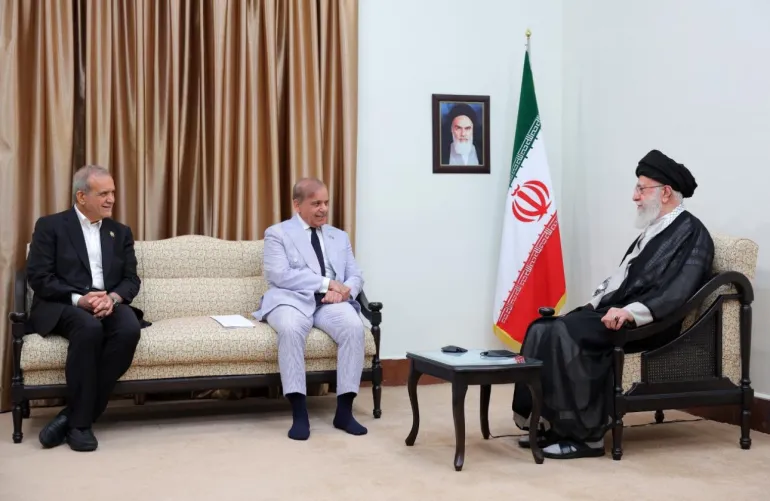Pakistan swiftly condemned Israel’s recent military strikes on Iran, calling them a breach of Iranian territorial sovereignty and a “blatant provocation.” The Ministry of Foreign Affairs in a statement on June 13 urged the international community and the United Nations to act against what it labeled aggression and to uphold international law.
What the World’s Air Traffic Looks Like Amid Global Conflicts
Rising Human Toll and Regional Spillover
The Israel-Iran conflict has already resulted in more than 220 deaths in Iran and over 20 deaths in Israel, with hundreds more injured on both sides. As the war enters its sixth day, Islamabad fears the conflict’s escalation could destabilize the region, particularly along the 905-km border Pakistan shares with Iran.
Pakistan Closes Border Crossings in Balochistan
In response to rising tensions, Pakistan closed five border crossings in Balochistan on June 15. The move is aimed at curbing any potential security threats and refugee influx. Officials confirmed that over 500 Pakistanis, including pilgrims and students, have returned from Iran since the escalation.
“On Monday, 45 students and nearly 500 pilgrims crossed back into Pakistan via the Taftan border,” said Naeem Ahmed, Assistant Commissioner at Taftan.
Strategic Importance of Taftan and Balochistan
Taftan, located in Balochistan’s Chaghi district, is a strategic border town and site of Pakistan’s 1998 nuclear tests. Balochistan itself is rich in minerals and energy resources and is home to Gwadar Port, a key hub in the $62 billion China-Pakistan Economic Corridor (CPEC).
A Complicated History with Iran
Despite recent cooperation, Pakistan and Iran have a history of tension, especially over cross-border militant activity. In January 2024, both countries exchanged missile strikes after Iran targeted separatist group Jaish al-Adl within Pakistani territory. Pakistan retaliated by striking hideouts of Baloch separatists in Iran.
Pakistan Offers to Mediate Peace Talks
Foreign Minister Ishaq Dar revealed in Parliament that Pakistan is in communication with Iran and is advocating for a peaceful resolution. According to Dar, Iran has expressed willingness to return to the negotiating table if Israel halts further attacks.
“We’ve conveyed Iran’s willingness for peace to other nations. There is still time to prevent further escalation,” he stated.
Balancing Diplomatic Ties with the West
Despite offering mediation, analysts believe Pakistan is cautious not to get too deeply involved. With efforts ongoing to rebuild ties with the U.S., Israel’s main ally, Pakistan is treading carefully.
“Pakistan doesn’t have the leverage to mediate meaningfully but wants the conflict to end swiftly,” said Umer Karim, a Middle East researcher at the University of Birmingham.
Security Risks in Balochistan
Experts warn that the escalating war could impact Balochistan, Pakistan’s largest yet most unstable province. Separatist groups such as the Balochistan Liberation Army (BLA) and Balochistan Liberation Front (BLF) operate across the Iran-Pakistan border and could exploit the situation.
“The border closures are likely aimed at preventing militants from crossing back into Pakistan,” noted Abdul Basit of the S. Rajaratnam School of International Studies.
Fear of Refugee Influx Echoes Afghanistan Crisis
Pakistan has previously faced large refugee inflows from Afghanistan, especially after the 1979 Soviet invasion and the 2021 Taliban takeover. Having deported nearly 1 million Afghans in 2023, Islamabad wants to avoid a repeat scenario with Iranian refugees.
“Given the porous border and close cultural ties, refugee inflow is a legitimate concern,” Basit added.
Concerns Over Israeli Air Superiority
Pakistan is also alarmed by Israeli claims of air dominance over Tehran, fearing that Israeli aerial reach could stretch dangerously close to its own territory.
“If Israel achieves full air superiority in Iran, it could disrupt the regional security balance and pose a threat to Pakistan’s western flank,” said Karim.
Pakistan’s Sectarian Sensitivities
Security expert Ihsanullah Tipu Mehsud emphasized that Pakistan, a Sunni-majority nation with a significant Shia minority (15%), must handle the situation delicately. Openly supporting Israeli military action against Iran could inflame sectarian tensions and destabilize the domestic landscape.
Conclusion: Walking a Diplomatic Tightrope
Pakistan finds itself in a precarious position—supporting Iran, seeking to avoid a new refugee crisis, and wary of regional power dynamics. As the conflict continues, Islamabad is likely to push for de-escalation while protecting its strategic interests and border security.


1 thought on “Iran-Israel Conflict Raises Alarm in Pakistan Amid Security and Strategic Fears”